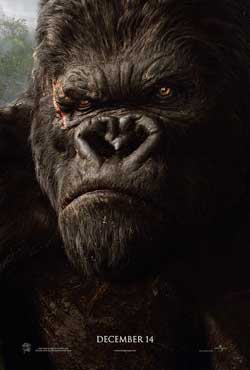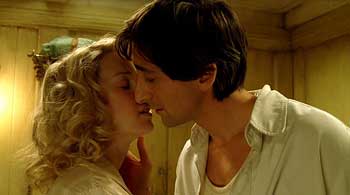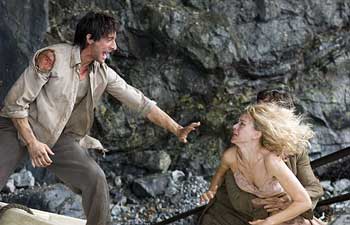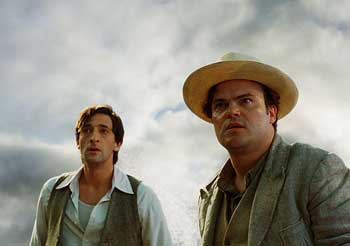 The screen’s least likely leading man comes from Queens, not too far from where I spent some of my childhood. In another world, Adrien Brody and I could have been best friends.
The screen’s least likely leading man comes from Queens, not too far from where I spent some of my childhood. In another world, Adrien Brody and I could have been best friends.
But the Oscar winner and I never met until the King Kong press junket in New York City, where he answered questions slowly and thoughtfully.
Q: A lot of the stuff on Skull Island was green screen – you were acting against nothing. Can you talk about that?
Brody: Well it’s very different, a very different approach from what I am normally used to. It’s exciting, finally to see it and to actually exist in another time, another realm where dinosaurs can exist. In a world in which dinosaurs could be there. That’s the beauty of that work, it is much more technical, but it is the same principal as things. You have to envision yourself in certain situations and sometimes it is harder because they are very extreme or you wouldn’t have any experiences to necessarily relate to. The stuff with the insects and all, there were no insects there obviously, and nothing there to hold on to. You got to run with it. It’s just a different process. I don’t quite know how to express what it’s like to do a scene with another person there. It’s theoretically the same thing. You let go of as much of yourself as you can, you try and lose as much of your own inhibitions and block out everything else and that is what you are doing there except there is less there.
Q: For the Bronto scene were you just running against a green screen?
Brody: There were a few different set ups. That was a complicated procedure. For the Bronto stampede we had terrain built outside Where I was jumping over rocks and things and we knew where certain things were to take place. We had animatics to refer to. There were treadmill shots where you’ve got to get high speed running that they have to do camera moves on and stuff. Pretty technical and all that. I know where the raptors are coming from and all that, but ultimately there’s no raptor. I wish there was.
Q: Were the Production Diaries guys always on set?
Brody:They were there on a daily basis; they were constantly filming everything. Peter I  think loves that and loves to capture the process and share it. It’s an interesting thing, he’s very generous in sharing his approach and style and I think it’s fascinating stuff and people are obviously intrigued by that and they want to… He’s genuinely enthusiastic about it and I kind of agree you don’t need to shroud everything in secrecy. I think it keeps people’s interest.
think loves that and loves to capture the process and share it. It’s an interesting thing, he’s very generous in sharing his approach and style and I think it’s fascinating stuff and people are obviously intrigued by that and they want to… He’s genuinely enthusiastic about it and I kind of agree you don’t need to shroud everything in secrecy. I think it keeps people’s interest.
Q: Did it require some adjustment?
Brody: I like a period personally to rehearse without it necessarily being out there. You need to have a moment to make the mistakes before the actual moment that you are shooting. I had the right to say, ‘Guys, I would rather you let me have this on my own for a minute.’ I would only do that if I felt there was something that I needed to work on, but it was rare. It’s on the really kind of more introspective roles that I need a lot of space and quiet if possible because it is very hard for me to think and everything kind of heightens when I am working, all of my senses are heightened. In this case you got used to it. It was nine months, so by the time it was over cameras were just everywhere and Jack [Black] was cracking jokes and I was cracking jokes, part of the process you know.
Q: As a native New Yorker can you talk about watching 1933 New York pop up on the screen?
Brody: Well, what was most impressive was that it had this kind of luminescent, kind of period feel. I only saw that in the finished product. Yes, there is all this technological stuff and these shots that are outrageous, but there are some of those shots with Ann and Kong that just look like they are out of a ‘30s movie; they had this glowing, almost kind of black and white aspect, which was beautiful. New York looks amazing, it was exciting for me. It was exciting obviously to get to play a guy who tries to save the city and try to get Kong out of the city.
I grew up driving, racing cars in Queens, so they were going to shoot that as a green screen sequence and I convinced Pete to let me drive it. I showed up one day and he didn’t tell me he was going to let me do it and there was a car there, a taxi cab with like six camera mounted on it, hundreds of thousands of dollars worth of camera equipment. They built like a one level New York, like a ground floor level and gave me the keys and said we’re going to shoot this and go for it, and this is the route, and I walked it with the stunt man and they let me drive it. It was so fucking exciting. I would come back and the stuntmen were cheering and Pete would come out and he was like, ‘Okay now this time you really push it!’ I was like, ‘Alright!’
and Pete would come out and he was like, ‘Okay now this time you really push it!’ I was like, ‘Alright!’
I almost killed a guy. It was on the sidewalk and the door flew – it was like an action sequence out of like some movie that I wouldn’t be in, and I was doing it for real – The door flew open on one of these shots, we’re driving, I look at the door, I bust an e-brake slide, like 90 degree turn and the door shuts and I keep driving and it’s all on camera, it’s amazing. It’s not in the movie I don’t think. It was fucking amazing, and that experience was really cool.
So to see that come to life with Kong chasing me in New York was a thrill.
Q: Did you and Peter talk about the development of your character compared to the two previous films? It seemed like you have more action and more expressions and less dialogue.
Brody: Nobody really had that much dialogue except from Denham. I think this is kind of an homage to the original, and I think my character is the one character that changed the most [from the orginal]. I had some apprehension about it because when that’s the case you had better be right. The change better be right because everybody knows about those changes and I think it’s very brave to create a kind of reluctant hero, leading man that’s not the typical kind of overtly muscular guy. It’s a guy who is just like Kong. Pulled out of his own element and forced to go fight for the things that he loves.
I think it was the right choice. I think it really was. The love story ends up being more truthful because the screenwriter would definitely be falling for the beautiful lead actress he is writing for and she already admired his work. The original, it lacked authenticity in that respect. He was a ship’s first made and the next minute he’s like, ‘Ann I think I love you,’ and then he was in love with her. Where did that happen? That’s what I wanted to avoid, that is what I voiced to Peter. There was only a limited amount of time to make that work because everybody wants to go get Kong and see Skull Island and get that part of the action started. So you have to set that up, but you can’t spend too long setting it up.
Q: How has it been adjusting to your new fame since winning the Oscar?
Brody: Life is weirder I guess. The decision making process is pretty similar, there are other considerations, but I feel very fortunate. It’s been a long haul to get here; I have been acting most of my life. I’m pinching myself often because I do feel blessed to have the opportunities that I have, to do what I love.
Q: Is it harder to go out?
Brody: Absolutely. No question. It’s part of it, nothing’s perfect. But you know what I went out a lot when I was younger and when you go out it’s more fun. When you go to night clubs when you’re underage it’s more fun. It’s nice to go out, but things are more complicated. It’s better to know what I know and to experience what I have experienced than to have never received that recognition and to never have had access to really interesting roles in major pictures.
Q: How does it feel going in on a production with a script not even finished?
Brody: It’s tricky. I did it with Ken Loach. Ken Loach’s movie I had no script. They didn’t want to show me any of it. I said I have got to see at least some of the tone of the character because he didn’t really want even to tell me that much. It was very hard to start, but what was important there was do the research, find out all you can, be as authentic as possible in an improvisational situation, much more difficult. I knew they had my best interest at heart and they have a good track record. I like them, I genuinely like Peter and Fran [Walsh] and Philippa [Boyens] and I love the story. It was a no-brainer really. There was a script by the time we began shooting, but things were changing and we’d be able to contribute and work things out. So it was a different process, but it wasn’t negative, you have to figure things out along the way.
I knew they had my best interest at heart and they have a good track record. I like them, I genuinely like Peter and Fran [Walsh] and Philippa [Boyens] and I love the story. It was a no-brainer really. There was a script by the time we began shooting, but things were changing and we’d be able to contribute and work things out. So it was a different process, but it wasn’t negative, you have to figure things out along the way.
Q: Would you do it again without Peter?
Brody: Not based on past experiences, but it depends on the role and it depends on how well the filmmaker conveys what is needed from me. Even if it is largely improvisational, if it is a character that I really want to explore and I can go research it and nail it and I really want to be that for a few months or more I’m game. If it is some kind of experimental thing that’s interesting. I usually don’t come across that and it is not a way for me to jump into a project, probably I wouldn’t do it very often. I haven’t done it very often. It’s good to read a script and be moved by the script. Truth, Justice, the film I did in the interim is a beautifully written script and I jumped at that.
Q: When you and Naomi come together in the film it worked really well. When you are filming something like that does it just feel like it is working?
Brody: Yeah it felt good; there was chemistry. She’s obviously attractive, it’s a scene that makes a lot of sense, the writing was good. You never know anyway, even if it feels like you made a connection, you never know.
Q: Talk about your other projects.
Brody: [Truth, Justice] is all I’ve shot in between. It looks like I’m going to do Manolete, which I am going to be in Spain and I’m going to go train with some bullfighters. That’s the plan. Where’s Andy Serkis when you need him? That’s the only thing that I know that I should be doing.
I don’t really like to talk about anything until they’re done. I was supposed to be the lead in Thin Red Line, and that was done and I didn’t know that until I saw it. So let’s not talk about things until I see it.